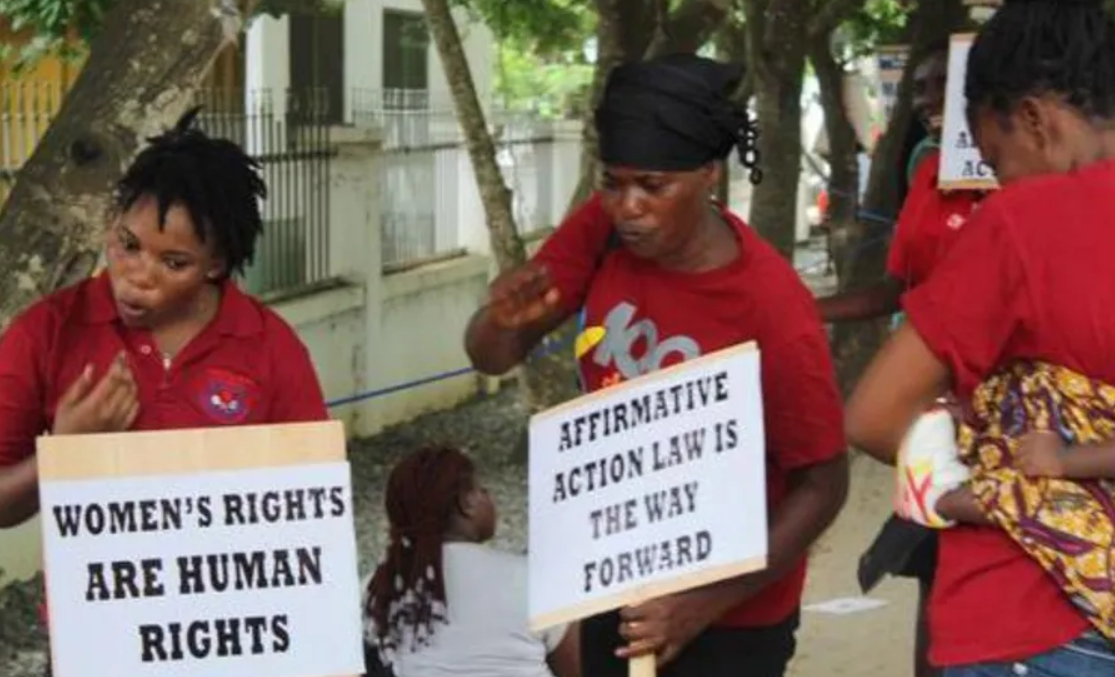With the passing of the Affirmative Action (Gender Equality) Act 2024, Ghana has taken a giant leap forward in its fight for gender equality. After over three decades of protracted debate, President Nana Akufo-Addo finally signed the bill into law. This law went through several parliamentary shuffles after being presented in 1998 and was passed in July 2024. In an effort to increase the representation of women in positions of power, Ghana has joined an increasing number of African countries that have passed affirmative action legislation.
An Exciting Win for Those Fighting for Gender Equality
Advocates for women’s rights, who had been critical of the government’s slow action, may finally celebrate the Affirmative Action Act’s approval. To combat the gender gap in leadership positions, Ghana has joined the ranks of nations that have passed affirmative action legislation, including Mozambique, Rwanda, Uganda, and Burundi. These countries have established and strive to maintain a minimum quota of 30% for women in parliament and other important state agencies, which Ghana aspires to emulate and improve upon.
Sections of the Affirmative Action Law in Ghana
The goal of the Affirmative Action Act is to ensure that women hold positions of leadership in government, public organizations, and other fields. The law states, among other things, that women must make up at least 30% of decision-makers in all branches of government by 2030, with the ultimate aim of reaching 50%, in line with UN Sustainable Development Goal 5: Gender Equality.
Private enterprises can take advantage of tax benefits if they meet the legal requirement of having more women in leadership positions, and this need applies not only to governmental offices but also to trade unions. A more equitable society in which women can fully engage in politics, business, and national security is the stated goal of this lofty piece of law.
Repercussions for Violating the Law
Organizations and people that do not adhere to the new law will face heavy fines. There can be no gender-based discrimination, including but not limited to hate speech, stereotyping, and the denial of equal opportunity, in this place. Violators may be subject to fines or jail terms of six to twelve months. Furthermore, unions run the danger of having their registered status revoked if they do not implement gender equality measures on their executive boards. Any attempt to discredit, victimize, or otherwise prevent women from assuming positions of leadership is likewise illegal.
What People Are Having to Say
Legislators and organizations advocating for women’s rights have given the bill their enthusiastic approval. Female lawmakers see it in Ghana as a potent weapon in the fight for gender equality. Ghanaian lawmaker Abla Dzifa Gomashie, who represents the Volta Region, is hopeful that the bill will help eliminate the societal, institutional, and economic hurdles that women and minorities, particularly those with disabilities, encounter on a daily basis. To ensure the law’s provisions are widely known and enforced, she stressed the significance of swift advocacy actions.
Some have voiced doubts on the efficiency of the law’s enforcement, notwithstanding the widespread optimism. There is concern among some advocates that institutions, including political parties, might not completely follow the rules. A consultant for gender equality, Dinah Adiko, expressed worry about the possible absence of strong regulatory authority and rigorous oversight necessary to implement the law. Still, she is hopeful about the law’s potential, stressing that its passage is a great development.
Minimal Resistance to Affirmative Action Legislation
There has been very no pushback against the bill from the public or prominent figures in the media. At a recent news conference, one journalist implied that the legislation could encourage tokenism when she asked whether “discrimination in favor of women” was a flawed strategy. Minister for Gender, Children, and Social Protection Dakota Newman of Ghana swiftly dispelled these fears, reiterating the notion that women in Ghana are fully capable of occupying positions of power and influence. The Minister made it clear that the goal of the law is not symbolic representation but rather the elimination of gender disparities in positions of power.
Thirty Years of Postponement: Political Obstacles and Lost Chances
Political inaction has made the lengthy and difficult process of passing the Affirmative Action Act all the more difficult. The law languished in the legislative pipeline for years, despite repeated promises to advance it by the two main political parties in Ghana, the New Patriotic Party (NPP) and the National Democratic Congress (NDC). Several parliamentary reintroductions of the bill have previously been shelved due to political shifts and requests for additional stakeholder input.
The current administration under President Akufo-Addo finally moved on the bill after Speaker of Parliament Alban Bagbin said in 2023 that it needed more consultation and modification before it could be passed. The law had progressed to the cabinet stage when Dinah Adiko, a technical advisor for the Gender Ministry in Ghana in 2014, recalled that it was again halted due to political shifts.
The Affirmative Action Act will be an essential tool in creating a future where women can completely participate to Ghana’s growth as the country approaches 2030, the year set as the aim for attaining gender equality under the United Nations’ Sustainable growth Goals. The law can change Ghana’s political, economic, and social climate for the better for future generations if regulated, advocated for, and overseen properly.

















